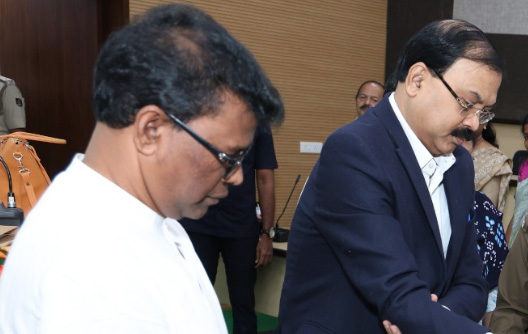Bhubaneswar: State Government in Department of Forest, Environment, and Climate Change (FE&CC) today signed three significant agreements to enhance the state’s climate resilience and sustainable development efforts.
The Department has signed the MoUs with the IIT, Bhubaneswar, World Food Programme (WFP) and Council on Energy, Environment and Water (CEEW) here in presence of Minister Ganesh Ram SinghKhuntia, Additional Chief Secretary (ACS) Satyabrata Sahu, Director, Environment, Prem Kumar Jha and other Senior Officials of the Department.
These collaborations aim to tackle climate change challenges, promote sustainable livelihoods, and protect Odisha’s rich biodiversity and coastal ecosystem.
The MoU with IIT Bhubaneswar was for “Protection, Restoration and Management of seagrass beds and salt marshes along the Odisha coast.
The collaboration under the Enhancing Climate Resilience of India’s Coastal Communities (ECRICC) project focuses on restoring critical coastal ecosystems, including seagrass beds and salt marshes, which are vital for biodiversity, carbon sequestration, and coastal protection, officials said.
This will stress upon the importance of ecosystem-based approaches to enhance the resilience of coastal communities. Designated as the Technical Support Agency (TSA) for the restoration, protection, and sustainable management of seagrass and saltmarsh ecosystems along the Odisha coast, IIT Bhubaneswar will provide technical support for implementing sustainable strategies to manage these ecosystems.
During the event, the Minister emphasized that the collaboration with IIT Bhubaneswar would pave the way for enhanced research opportunities and community engagement initiatives to promote sustainable coastal management practices.
The Director, IIT Bhubaneswar provided insights into the technical aspects of the project. He outlined the planning and implementation strategies, which involve both national and international co-consultants appointed by the Technical Advisory Committee for Seagrass and Salt-Marshes.
The FE&CC Department also inked a Letter of Understanding (LoU) with the World Food Programme (WFP) for a regional adaptation project between India and Sri Lanka called Adaptation for Resilience (ADAT4R) to strengthen the resilience of vulnerable farming communities facing increased impacts of climate change.
Focused on Nuapada district, this five-year initiative aims to strengthen the resilience of vulnerable farming communities, particularly women farmers, against the impacts of climate change.
Supported by the Adaptation Fund, the project will promote diversified livelihoods, resilient farming practices, and improved access to climate services.
Shri Singhkhuntia reaffirmed Odisha’s commitment to safeguarding farmers’ livelihoods and food security in the face of climate vulnerabilities.
Nozomi Hashimoto, Deputy Country Director for WFP in India, remarked that “ADAPT4R will equip smallholder and women farmers with tools and knowledge for resilient farming practices and provide smallholders with skills to adapt to climate change.
Additionally, it will promote sustainable farming techniques to endure adverse weather. These goals are part of a broader effort to ensure that farming communities can thrive despite the challenges posed by climate change, he said.
The third MoU with the Council on Energy, Environment and Water (CEEW), one of Asia’s leading think tanks, signed a MoU to develop a Net-Zero Roadmap for the State. The initiative will chart decarbonization strategies across key sectors such as industry, power, transport, and agriculture.
Shri Singhkhuntia emphasized that this partnership marks a significant step in aligning Odisha’s economic growth with India’s 2070 net-zero targets. The senior representative from CEEW, highlighted that Odisha’s leadership in low-carbon development could serve as a model for other states in India, he said.
These partnerships underscore Odisha’s leadership in addressing climate challenges through innovative, data-driven, and inclusive approaches. Collectively, these initiatives strengthen the state’s Vision Odisha 2036, advancing its goals of sustainable development, biodiversity conservation, and climate resilience.


